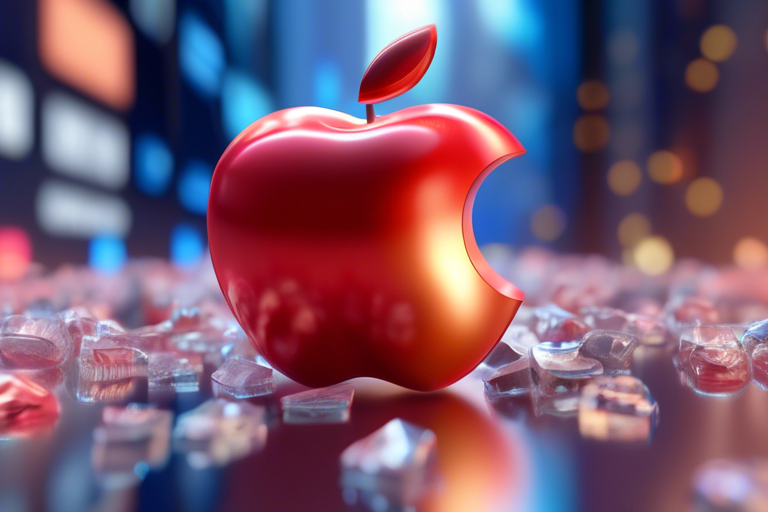Unraveling EU Regulation’s Impact on Apple and the Crypto Market 🕵️♂️
Amidst increasing regulatory pressure, Apple Inc. finds itself in the spotlight once more due to its app store practices. The European Union (EU) has intensified its regulatory actions, focusing on the technology and cryptocurrency sectors to ensure fair competition and uphold market integrity. This regulatory approach highlights the EU’s efforts to curb the influence of major corporations and prevent market manipulation within digital markets.
Decoding the EU’s Demands 📜
– The European Commission recently accused Apple of breaching the new Digital Markets Act (DMA), aimed at preventing tech giants from exploiting their market dominance.
– Apple’s App Store policies have been criticized for inhibiting app developers from redirecting customers to cheaper alternatives outside the App Store.
– The “anti-steering” practice, which restricts businesses from informing users about more cost-effective options, lies at the core of the violation.
– If found guilty of violating the DMA, Apple could be subject to fines equivalent to 10% of its global annual revenue.
Apple’s History and Present Situation 🍎
– Apple has faced regulatory scrutiny from EU authorities before, receiving a €1.8 billion fine earlier for anti-competitive behavior in the music streaming market.
– Despite making policy adjustments, the EU remains cautious about Apple’s adherence to DMA regulations.
– This case underscores the EU’s commitment to enforcing the DMA and ensuring that major tech players do not exploit their market authority.
Crypto Market under Close Regulatory Scrutiny 🔍
– The EU is tightening regulations on the cryptocurrency market, with countries like Italy planning to implement strict measures to monitor crypto-asset risks.
– A draft decree in Italy outlines substantial fines for activities like insider trading, unauthorized information disclosure, and market manipulation.
– The broader implementation of the Markets in Crypto-Assets (MiCA) framework aims to provide comprehensive oversight to the crypto sector.
– National Competent Authorities (NCAs) within EU countries are designated to supervise the crypto industry, reflecting the EU’s commitment to robust regulation in the tech and financial sectors.
The Ultimate Focus: Compliance and Adaptation 🎯
– Businesses operating in the technology and cryptocurrency domains must acclimate to the evolving regulatory landscape set forth by the EU.
– The DMA works towards curbing the dominance of tech giants like Apple, while MiCA targets market manipulation in the crypto sphere.
– These regulatory changes aspire to foster fair competition and enhance market stability, necessitating companies to prioritize adherence to regulations and transparency.
What is your take on the allegations against Apple? How do you see the evolving regulatory landscape impacting the tech and crypto sectors in the EU?
Explore how laws and regulations shaping blockchain technology and cryptocurrencies, such as Bitcoin, can influence their adoption rates.
Understanding the Regulatory Allegations Against Apple and the Crypto Market 🌐
Amidst mounting regulatory pressures, Apple Inc. is once again in the regulatory crosshairs over its app store practices. The European Union (EU) has intensified its regulatory efforts, focusing on the technology and cryptocurrency sectors to ensure fair competition and maintain market integrity. This regulatory approach highlights the EU’s commitment to restraining the power of major corporations and preventing market manipulation within digital landscapes.
Decoding the EU’s Demands 📜
– The European Commission recently accused Apple of breaching the new Digital Markets Act (DMA), designed to prevent tech giants from exploiting their market dominance.
– Apple’s App Store policies have faced criticism for restricting app developers from directing customers to alternative purchasing options outside the App Store.
– The “anti-steering” practice, prohibiting businesses from informing users about more cost-effective alternatives, serves as the crux of the violation.
– If found guilty of violating the DMA, Apple could potentially endure fines amounting to 10% of its global annual revenue.
Apple’s Past and Present 🍎
– Apple has encountered EU regulatory fines before, receiving a €1.8 billion penalty earlier this year for anti-competitive conduct in the music streaming sector.
– Despite implementing policy changes, the EU maintains a vigilant stance regarding Apple’s compliance with DMA regulations.
– This case underscores the EU’s dedication to upholding the DMA and ensuring that major tech entities do not exploit their market dominance.
Rigorous Oversight in the Crypto Market 🔍
– The EU is strengthening regulations within the cryptocurrency market, with countries like Italy preparing to enforce stringent measures to monitor crypto-asset risks.
– An Italian draft decree outlines substantial fines for activities such as insider trading, unauthorized information disclosure, and market manipulation.
– The expansive implementation of the Markets in Crypto-Assets (MiCA) framework seeks to provide comprehensive oversight of the crypto sector.
– National Competent Authorities (NCAs) across EU nations are tasked with supervising the crypto industry, portraying the EU’s dedication to robust regulation within the tech and financial domains.
Emphasizing Compliance and Adaptation 📊
– Businesses within the technology and cryptocurrency sectors must acclimatize to the evolving regulatory landscape introduced by the EU.
– The DMA seeks to curtail the dominance of tech giants like Apple, while MiCA aims to address market manipulation within the crypto realm.
– These regulatory transformations aspire to foster equitable competition and bolster market stability, necessitating companies to prioritize regulatory compliance and transparency.
How do you perceive the allegations against Apple? Share your insights on the shifting regulatory environment impacting the tech and crypto industries within the EU.
Discover the influence of laws and regulations on blockchain technology and cryptocurrencies like Bitcoin, affecting their adoption rates.





 By
By
 By
By
 By
By


 By
By